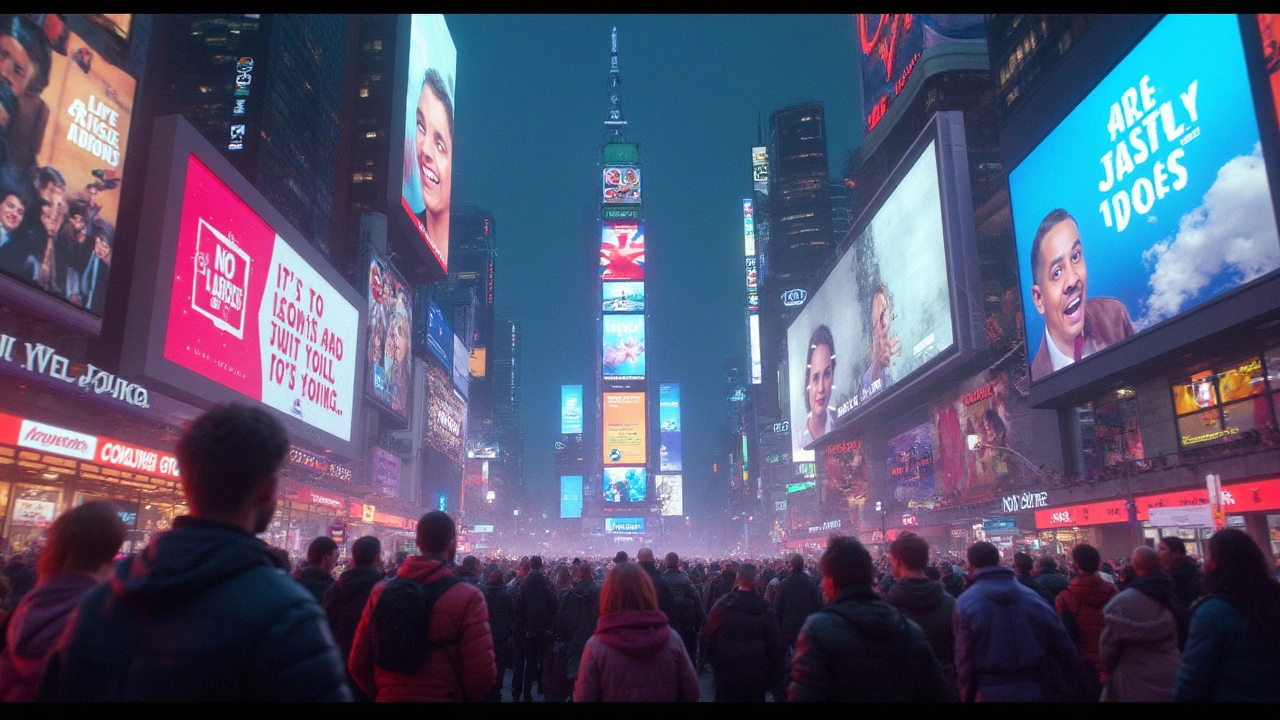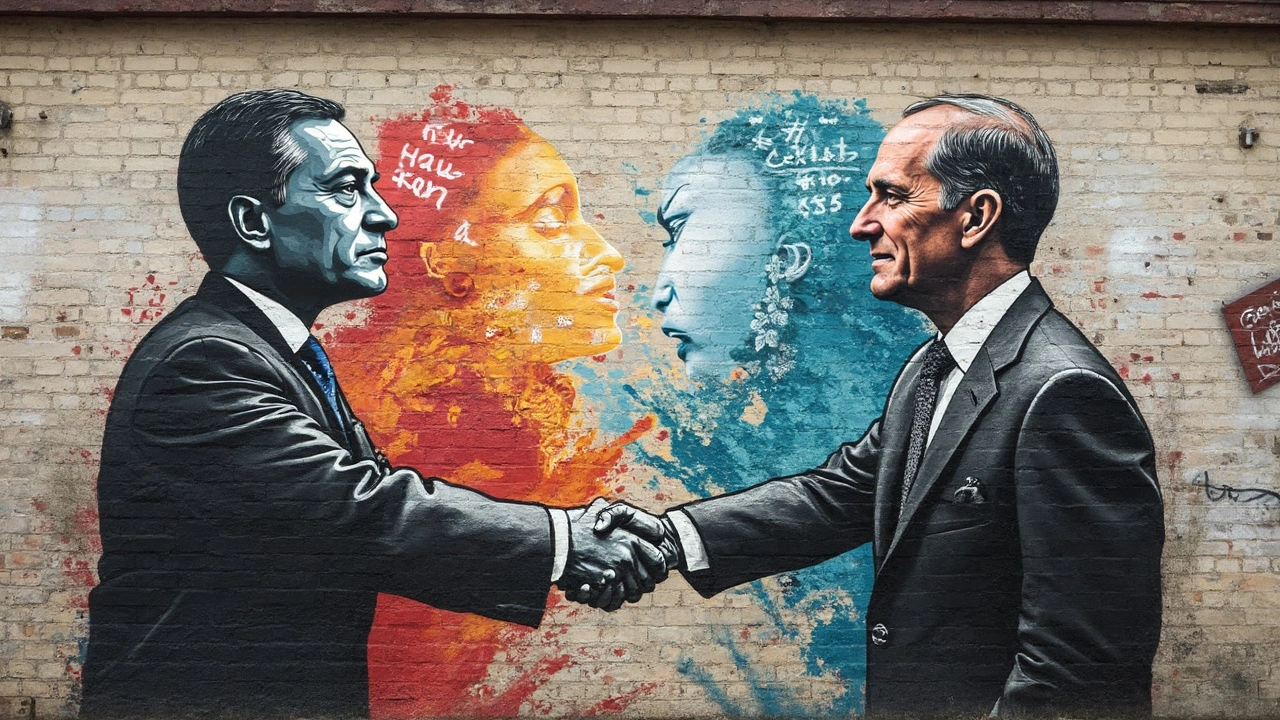
As we navigate the political landscape in 2025, more folks are looking for options beyond the age-old Democrat and Republican parties. It's not just about the two giants anymore. That's where groups like No Labels come in. They're shaking things up with their centrist vibes and a mission to tackle the partisan grind that’s bogged down progress for years.
No Labels, launched back in 2010, aims to break the cycles of extreme partisanship with a call for cooperation across the aisle. But what does that really mean for the average voter? Let's dig into what this group is all about and whether they might be your new political home.
No Labels
No Labels isn't your typical political party. They're more of a movement pushing for bipartisan teamwork. Think of them as the folks who want to bridge the gap rather than widen the divide. They've been doing this by endorsing candidates from both the main parties and occasionally putting forward independent ones when they think it's right.
Pros:
- Encourages dialogue between opposing factions, which is pretty refreshing these days.
- Focuses on pragmatic issues like fiscal responsibility, which sometimes gets lost in the shuffle.
- Appeals to moderates who feel homeless in today's political climate.
Cons:
- Without a solid ideological foundation, it can feel like they're just floating between ideals.
- Despite their intentions, sometimes they struggle to leave a real mark on legislation.
- For some, their approach can seem like political dodginess, lacking in clear, specific policies.
Introduction
It's 2025, and the political scene has evolved beyond the usual Democrat and Republican showdown. With more folks interested in shaking things up, alternative political parties like No Labels are gaining traction. This isn't just confined to the United States; here in the UK, people are equally curious about these emerging factions and what they stand for.
The idea of a third option might sound appealing, especially for those tired of traditional politics. No Labels, for instance, launched in 2010, has been on the mission to mend what they see as a broken system that needs less finger-pointing and more hand-holding. They don't classify themselves strictly as a party, yet their presence is felt as they endorse and sometimes even field candidates.
Why is this relevant, you ask? Well, consider how political gridlock has slowed down decision-making processes that impact everything from the economy to climate policy. The aim now is to engage in dialogues focused on consensus, not conflict. For the voter, this might translate into policies that make practical sense rather than being politically expedient.
But what does that mean for societal issues? No Labels concentrates on themes like fiscal responsibility, striving for a balanced budget, and supporting policies that aren't weighed down by partisan agendas. So, if you feel like the current system overlooks practical needs, exploring these alternatives might open the door to fresh solutions.
So, whether you're a political enthusiast or just someone looking for sensible governance, let's explore what No Labels and other alternatives have to offer in addressing today's pressing issues.
No Labels
No Labels kicked off in 2010 as a centrist political organization with a bold mission: to cut through the shouting matches of extreme partisan politics that often seem like background noise in government. They’re all about finding the middle ground and getting stuff done.
This group focuses on bridging divides, especially as political extremes continue to polarize voters. Sure, they have their quirks: not a traditional party in the sense of Democrats or Republicans, but more of a movement that endorses from both sides of the aisle.
So why bother with No Labels? Well, their core philosophy is all about cooperation. In a political climate cluttered with bickering and gridlock, they strive for meaningful progress. Imagine doing politics where the game isn’t just about the win—but about who wins what or when. Sounds good, right?
What They Stand For
Fiscal responsibility is a big one for No Labels. It’s not a sexy issue, but it’s crucial. While big names tussle over headline stuff, they push for responsible budgeting and deficit reduction. They argue that fixing the country’s financial house should be a unifying cause.
They’re also about efficiency in government—cutting through the red tape and getting better results. And when it comes to pressing issues like immigration reform, they support fair policies that don’t swing too far left or right.
The Catch
Despite their good intentions, critics of No Labels often point out a couple of things. They sometimes lack a concrete ideological stance or super clear policies. Some folks see this as a weakness; others see it as flexibility. Beat that for divisive.
They're also up against the reality that without the machinery of a big party, influencing legislation isn’t always straightforward. But if you're fed up with the status quo and want to see folks actually working together, they might just be your cup of tea.

Pros of No Labels
No Labels has made a name for itself by sticking to the middle ground, where it believes it can make the biggest impact. One of the standout features of this group is its commitment to fostering bipartisan cooperation. While it isn't a novel idea, in today's politically charged landscape, it's nothing short of refreshing.
By actively encouraging dialogue between opposing sides, No Labels creates a rare space for discussion and compromise. In a world where everything seems divisive, having a platform that bridges gaps is a breath of fresh air. They’ve become a go-to for moderates or those feeling sidelined by the polarizing rhetoric of the main parties.
Another strong point for No Labels is their focus on fiscal responsibility. The group's emphasis on balance, particularly around budgets and deficit reduction, highlights a concern for long-term economic stability. With rising international competition and shifting markets, this approach could prove vital for any nation’s prosperity in the long haul.
Appeals to the Middle
In terms of attracting voters, No Labels taps into a sentiment shared by many: the desire for practical solutions rather than ideological battles. By doing so, they draw individuals who tire of picking sides and yearn for pragmatic governance that isn’t up for political drama every other day.
And it's not all talk; there's some evidence that folks are warming up to this idea. According to some surveys, more than 41% of Americans now identify as independents rather than aligning strictly with major parties. This data suggests an increasing openness to alternatives like No Labels.
Tables and numbers might seem dry, but they paint a pretty clear picture.
| Year | Pct of Independents |
|---|---|
| 2020 | 39% |
| 2023 | 41% |
What the table shows isn't just a trend; it's a testament to a growing appetite for change in the political fabric.
Cons of No Labels
Alright, let's talk about the flip side of the No Labels coin. While they've got some good intentions, it's not all rainbows and unicorns. One of the main gripes is their lack of a clear ideological stance. This can leave folks wondering what No Labels truly stands for when push comes to shove. Are they just trying to please everyone, or is there a core set of values they're holding onto?
Another issue is their struggle to make a tangible impact on legislative outcomes. Despite their efforts to promote cooperation, getting both sides of the aisle to agree is still like herding cats. Being in the middle means sometimes getting dragged into the gridlock they aim to fix.
Their policies can also feel a bit wishy-washy. Ask ten people what No Labels is all about, and you might get ten different answers. Voters often look for clear, specific policy proposals, and No Labels' broad approach may seem too vague for those craving concrete plans.
Lack of Influence
Despite endorsing candidates, the harsh reality is that No Labels doesn’t always pack the electoral punch needed to sway big decisions. The major parties still dominate the landscape, which can leave No Labels playing second fiddle when it comes to actual decision-making power.
However, it's not all doom and gloom. Acknowledging these downsides opens up the conversation about what No Labels could become with some tweaks and stronger pushes. But as it stands, they've got a few mountains to climb if they want to catch up to the traditional heavyweights.
Other Alternatives
Now that we've talked about No Labels, let’s check out a few other political parties in 2025 that are looking to make their mark beyond the standard Democrat and Republican scene. These alternatives are less famous but have some interesting ideas that resonate with certain groups of people.
The Green Party
The Green Party is a familiar name for those wanting a future focused on environmental issues. They've been advocating for policies to combat climate change, protect natural resources, and promote sustainable practices. Around 10% of voters in recent elections have shown support for the Green agenda, a number that's slowly inching upwards.
The Libertarian Party
For those yearning for small government and individual freedoms, the Libertarian Party is the answer. They're all about reducing government intervention in personal and economic affairs. Notably, they support policies like legalizing marijuana and defending the Second Amendment rights very strongly. Some folks appreciate their clear principles, even if their influence isn't as strong as larger parties.
The Working Families Party
This one’s for people who believe in fair work conditions and leveling the economic playing field. The Working Families Party fights for minimum wage increases, affordable healthcare, and paid family leave. By leveraging grassroots campaigns, they’ve managed to make some noise in local elections, especially in urban centers.
The Forward Party
Relatively new on the scene, the Forward Party stands for modernizing democracy and embracing innovation in governance. They want more technology in decision-making processes and are pushing policies that adapt to 21st-century needs. Though still trying to find their footing, their ideas are gaining traction among younger, tech-savvy citizens.
Here's a quick look at how some of these alternatives are fairing in terms of popular support:
| Party | Popularity in Recent Polls (%) |
|---|---|
| Green Party | 10% |
| Libertarian Party | 8% |
| Working Families Party | 5% |
| Forward Party | 3% |
So, while the Democrats and Republicans may still dominate headlines, there's a growing list of alternatives trying hard to be heard. Each has its own approach to fixing what they see as the country’s problems, and their unique voices are intriguing options for those feeling stuck in the two-party bind.

Conclusion
Diving into the world beyond the traditional Democratic and Republican strongholds, we find potential in groups like No Labels. They’ve carved a niche with a balanced platform focused on bridging political divides. But the question remains – how impactful are they really in the grand scheme of things?
Sure, they aim to foster bipartisan cooperation, but nothing comes easy in politics. Their biggest draw? The promise of unity. Just take a look at their track record; they’ve endorsed numerous candidates from both sides who aim to put collaboration over conflict. But without a distinctive ideological home, they sometimes leave voters wondering what they truly stand for.
To wrap it all up with a neat little bow, here's a quick comparison of what No Labels brings to the table:
| Aspect | No Labels |
|---|---|
| Foundation Year | 2010 |
| Main Focus | Bipartisan cooperation and reducing gridlock |
| Strengths | Appeals to moderates, encourages fiscal responsibility |
| Weaknesses | Lacks clear ideological platform, struggles with influence |
So, if you’re contemplating life beyond the big two, weigh these factors. Is the appeal of working together enough to offset the lack of concrete policies? That’s something only you can decide.